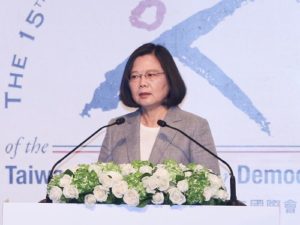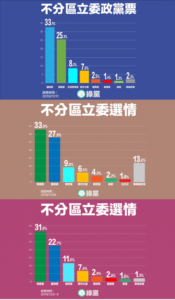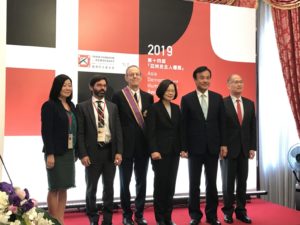
President Tsai Ing-wen. Source: Taiwan News
The most consequential election of 2020 might not come at the end of the year, when US President Donald Trump seeks a second term in the White House, but much earlier and closer to home for Australia, in Taiwan this weekend, according to the Lowy Institute.
Taiwan has long been seen as important as a proxy for the battle for hegemony between China and the United States in the region. The geo-strategic implications of China gaining control of Taiwan are nothing less than transformational, as such an event would signal the definitive end of the US-dominated post-war system in what is now the world’s most dynamic economic region, say analysts Natasha Kassam and Richard McGregor:
Equally significant are the possible means by which China wins — either through a military victory, which, no matter how quickly it was achieved, would be disruptive to the global economy — or by undermining the island’s now well-established democracy, which would mark a significant advance in the rise of authoritarian global governance and undermine other democracies in Asia.
 Which is why Taiwan is ‘battling a wave of online disinformation’ as Beijing employs various ‘active measures’ to influence the election.
Which is why Taiwan is ‘battling a wave of online disinformation’ as Beijing employs various ‘active measures’ to influence the election.
Taiwan’s National Security Bureau in May issued a downbeat assessment of Chinese-backed disinformation on the island, urging a “‘whole of government’ and ‘whole of society’ response,” The New York Times reports:
Taiwanese society has woken up to the threat. The government has strengthened laws against spreading harmful rumors. Companies including Facebook, Google and the messaging service Line have agreed to police their platforms more stringently. Government departments and civil society groups now race to debunk hoaxes as quickly as they appear.
The election will put these efforts — and the resilience of Taiwan’s democracy — to the test. “The ultimate goal, just like what Russia tried to do in the United States, is to crush people’s confidence in the democratic system,” said Tzeng Yi-suo of the Institute for National Defense and Security Research, a think tank funded by the government of Taiwan.

Source: Taiwan Green Party
At the time of writing, President Tsai is leading in the polls by 30 percent, according to reports.
Taiwan can teach struggling countries about its success in building a democracy, said Carl Gershman, president of the National Endowment for Democracy (NED).
“Taiwan was an authoritarian country, and it made a remarkably interesting and important transition to democracy in the 1980s and the 1990s, and it continues,” he told the CNA news agency.
His comments came after being awarded the Order of Brilliant Star with Grand Cordon from President Tsai Ing-wen (above) in recognition of his contribution to the consolidation of Taiwan-US relations, as well as advancing freedom and democracy around the world.
Assessing the Results of Taiwan’s Election
Keynote remarks by
The Honorable Ted Yoho (R-FL), United States Representative and Chairman, House Foreign Affairs Subcommittee on Asia and the Pacific.
Ambassador Stanley Kao, The Taipei Economic and Cultural Representative Office in the U.S.
 Followed by a panel discussion with
Followed by a panel discussion with
Bonnie Glaser, Senior Adviser for Asia and Director of the China Power Project,
Center for Strategic and International Studies
Mark Stokes, Executive Director, Project 2049 Institute
Robert Sutter, Ph.D., Professor of Practice of International Affairs, George Washington University
Panel chaired by
 Russell Hsiao, Executive Director, Global Taiwan Institute [and former National Endowment for Democracy Penn Kemble fellow]
Russell Hsiao, Executive Director, Global Taiwan Institute [and former National Endowment for Democracy Penn Kemble fellow]
Hosted by
Walter Lohman, Director, Asian Studies Center, The Heritage Foundation
Monday, January 13, 2020 – 10:30 AM to 12:00 PM
The Heritage Foundation’s Lehrman Auditorium
214 Massachusetts Avenue NE, Washington, DC 20002
Register to attend in person







